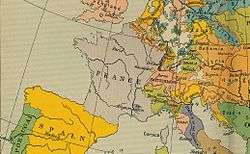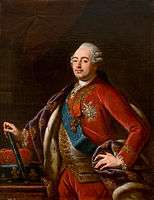Constitutional Cabinet of Louis XVI
The Kingdom of France as remnant of the preceding absolute Kingdom of France, was a constitutional monarchy that governed France from 3 September 1791 until 21 September 1792, when this constitutional monarchy was succeeded by the First Republic.
Kingdom of France Royaume de France (French) | |||||||||
|---|---|---|---|---|---|---|---|---|---|
| 1791–1792 | |||||||||
 State Coat of arms
| |||||||||
 Kingdom of France, September 1791 – September 1792 | |||||||||
| Capital | Paris | ||||||||
| Common languages | French | ||||||||
| Religion | Constitutional Church | ||||||||
| Government | Constitutional monarchy | ||||||||
| King of the French | |||||||||
• 1791–1792 | Louis XVI | ||||||||
| Legislature | Legislative Assembly | ||||||||
| History | |||||||||
| 3 September 1791 | |||||||||
• Storming of the Tuileries | 10 August 1792 | ||||||||
| 21 September 1792 | |||||||||
| Currency | Assignat | ||||||||
| ISO 3166 code | FR | ||||||||
| |||||||||
| Constitutional Cabinet of Louis XVI | |
|---|---|
Cabinet of Kingdom of France | |
 | |
| Date formed | 3 September 1791 |
| Date dissolved | 21 September 1792 |
| People and organisations | |
| Head of state | King Louis XVI |
| Head of government | King Louis XVI |
| No. of ministers | 5 |
| Total no. of members | 24 |
| Member party | Independents, Feuillants, Moderate Jacobins (1792) |
| Status in legislature | Legislative Assembly |
| Opposition party | Jacobins |
| Opposition leader | Georges Couthon, Pierre Victurnien Vergniaud and others |
| History | |
| Election(s) | 1791 |
| Legislature term(s) | 6 September 1791 – 2 September 1792 |
| Successor | Government of the National Convention |
On 3 September 1791, the National Constituent Assembly forced king Louis XVI to accept the French Constitution of 1791, thus turning the absolute monarchy into a constitutional monarchy.
After the 10 August 1792 Storming of the Tuileries Palace, the Legislative Assembly on 11 August 1792 suspended this constitutional monarchy.[1] The freshly elected National Convention abolished the monarchy on 21 September 1792, ending 203 years of consecutive Bourbon rule over France.
Background
France had been undergoing a revolution in its government and social orders. A National Assembly declared itself into being and promulgated their intention to provide France with a fair and liberal constitution.[2] Louis XVI moved to Paris in October of that year but grew to detest Paris and organised an escape plot in 1791. The escape plot known as the Flight to Varennes ultimately failed to materialise and destroyed any positive public opinion for the monarchy.[3] Louis XVI's brothers-in-exile in Coblenz rallied for an invasion of France. Austria and Prussia responded to the royal brothers' cries and released the Declaration of Pillnitz in August. The declaration stated that Prussia and Austria wished to restore Louis XVI to absolute power but would only attempt to do so with the assistance of the other European powers.[4]
Constitution
Louis XVI was forced to adopt the Constitution of 1791 by the National Assembly in the aftermath of his Flight to Varennes to the Austrian Netherlands.[5] The Constitution of 1791 which established the Kingdom of the French was revolutionary in its content. It abolished the nobility of France and created all men equal before the law. Louis XVI had the ability to veto legislation that he did not approve of as the legislation still needed Royal Assent to come into force.[6]
Republic
Louis XVI reluctantly declared war on Austria on 20 April 1792 bowing to the assembly's wishes. Prussia allied with Austria and therefore France was at war with Prussia as well.[7] The Brunswick Manifesto of August 1792 issued by the Duke of Brunswick, Commander of the Austrian and Prussian military brought about the Storming of the Tuileries on 10 August 1792. The manifesto explicitly threatened the people of Paris with dire repercussions if they in any way harmed Louis XVI or his family.[8] The Legislative Assembly was inundated with requests for the monarchy's demise. The President of the National Assembly responded by suspending the monarchy on 11 August pending the outcome of elections for another assembly.[1] The newly elected National Convention elected under universal male suffrage abolished the monarchy on 21 September 1792. The convention proclaimed a republic.[9]
Government composition
| Portfolio | Minister | Took office | Left office | Party | |
|---|---|---|---|---|---|
| King of the French | Louis XVI | 6 September 1791 | 2 September 1792 | Independent | |
| Minister of Finances | Louis Hardouin Tarbé | 29 May 1791 | 24 March 1792 | Feuillant | |
| Étienne Clavière | 24 March 1792 | 13 June 1792 | Girondins | ||
| Antoine Duranton | 13 June 1792 | 18 June 1792 | Girondins | ||
| Jules de Beaulieu | 18 June 1792 | 29 July 1792 | Independent | ||
| René Delaville-Leroulx | 29 July 1792 | 10 August 1792 | Independent | ||
| Secretary of State for Foreign Affairs | Claude Antoine de Valdec de Lessart | 29 November 1791 | 15 March 1792 | Feuillant | |
| Charles-François Dumouriez | 15 March 1792 | 13 June 1792 | Girondins | ||
| Pierre Paul de Méredieu | 13 June 1792 | 18 June 1792 | Independent | ||
| Victor de La Garde de Chambonas | 18 June 1792 | 23 July 1792 | Girondins | ||
| François Joseph de Gratet | 23 July 1792 | 1 August 1792 | Feuillant | ||
| Secretary of State for War | Louis de Narbonne-Lara | 7 December 1791 | 9 March 1792 | Feuillant | |
| Pierre Marie de Grave | 9 March 1792 | 9 May 1792 | Feuillant | ||
| Joseph Servan | 9 May 1792 | 13 June 1792 | Girondins | ||
| Charles-François Dumouriez | 13 June 1792 | 18 June 1792 | Girondins | ||
| Pierre August Lajard | 18 June 1792 | 23 July 1792 | Feuillant | ||
| Charles d'Abancour | 23 July 1792 | 10 August 1792 | Feuillant | ||
| Secretary of State of the Navy | Claude Antoine de Valdec | 18 September 1791 | 7 October 1791 | Feuillant | |
| Bertrand de Molleville | 7 October 1791 | 16 March 1792 | Feuillant | ||
| Jean de Lacoste | 16 March 1792 | 21 July 1792 | Independent | ||
| François Joseph de Gratet | 21 July 1792 | 10 August 1792 | Feuillant | ||
| Keeper of the Seals | François Duport-Dutertre | 21 November 1790 | 23 March 1792 | Feuillant | |
| Jean-Marie Roland | 16 March 1792 | 14 April 1792 | Girondins | ||
| Antoine Duranton | 14 April 1792 | 4 July 1792 | Girondins | ||
| Étienne Dejoly | 4 July 1792 | 10 August 1792 | Feuillant | ||
Citations
- Fraser, 454
- Hibbert, 63
- Hibbert, 130
- Hibbert, 143
- Jones, 426
- The Constitution of 1791 Archived 17 December 2011 at the Wayback Machine
- Hibbert, 145
- Jones, 459
- Jones, 462
References
- Fraser, Antonia: "Marie Antoinette: the Journey", Orion Books, London, 2001, ISBN 978-0-7538-1305-8
- Hibbert, Christopher: "The French Revolution", Penguin Books, Great Britain, 1982, ISBN 978-0-14-004945-9
- Jones, Colin: "The Great Nation: France from Louis XV to Napoleon", Columbia University Press, New York, 2002, ISBN 0-231-12882-7
.svg.png)